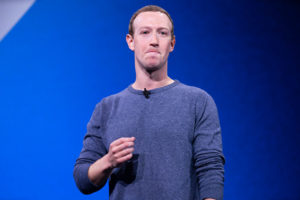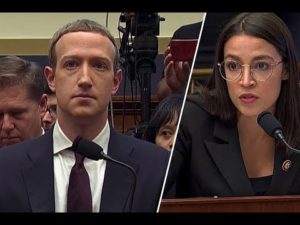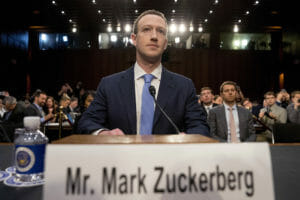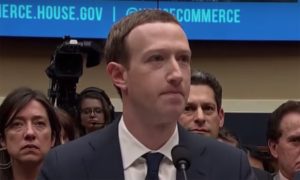How Cambridge Analytica’s Parent Company Infiltrated Yemen
Documents obtained by the Grayzone Project show how the SCL company conducted a surveillance operation using psychological profiling, “strategic communications campaigns” and infiltration of foreign operatives into local communities. CC BY 2.0 / Shop Catalog
CC BY 2.0 / Shop Catalog
Editor’s Note: This is part one of a two-part investigation into Cambridge Analytica/SCL’s global operations. The second installment will be published on Truthdig on Tuesday.
Internal documents exclusively obtained by the Grayzone Project and embedded at the end of this article show how Cambridge Analytica’s UK-based parent company, SCL group, conducted a surveillance operation in Yemen, using psychological profiling, “strategic communications campaigns,” and infiltration of foreign operatives into indigenous communities through unwitting local partners whom they were instructed to deceive.
The SCL documents describe “a research and analysis study undertaken by Strategic Communication Laboratories (SCL) on behalf of Archimedes,” a US-based military contractor. The name of the operation was “Project Titania.” It relied heavily on deception to gain access to the local population, ordering project operatives to develop a “cover story” that placed their presence in the country in a more innocent light.
The geographic targets of the project were Yemen’s Hadramout and Marib provinces. These regions have served as organizational bases for Al Qaeda in the Arabian Peninsula, and were at the time in the crosshairs of then-President Barack Obama’s drone assassination program.
Many of the methods of surveillance and manipulation revealed in these SCL documents closely mirror the tactics that were later applied in Western electoral contests. And when these tactics were exposed in early 2018, they ignited a political firestorm.
The data and behavioral analytics firm Cambridge Analytica closed shop this May following damaging revelations that it obtained the raw data of over 80 million Facebook users during the 2016 presidential election campaign, and exploited this information to influence the outcome of numerous political campaigns. The damage spread across the Atlantic, to Cambridge Analytica’s UK-based parent company, SCL group, forcing it to shutter its operations as well.
Cambridge Analytica was partially owned by Steve Bannon, the former manager of Trump’s 2016 presidential campaign and ex-White House chief of staff. It was co-owned by Bannon’s main financial angel at the time, reclusive right-wing tech billionaire Robert Mercer, and his daughter, Rebekah Mercer, who served as its vice president.
Cambridge Analytica debuted its work with a series of Republican Get Out the Vote efforts in 2014, deploying the psychological profiling techniques that have become the company’s bread and butter. “Its dirty little secret was that there was no one American involved in [the 2016 effort], that it was a de facto foreign agent, working on an American election,” former Cambridge Analytica research director Christopher Wylie revealed.
During the 2016 presidential campaign, Cambridge Analytica played a central role in Trump’s digital outreach efforts. In a hidden camera investigation by the UK’s Channel 4, Cambridge Analytica executives took credit for generating several enduring lines of attack against Hillary Clinton. “We just put information into the bloodstream of the internet and then watch it grow, give it a little push every now and again over time to watch it take shape,” one executive boasted. “And so this stuff infiltrates the online community, but with no branding, so it’s unattributable, untrackable.”
SCL Group and ‘Project Titania’
The ethically dubious tactics that Cambridge Analytica rolled out during the 2016 campaign had been honed by its parent company, the London-based SCL Group, in an array of influence operations in conflict zones and Third World election contests.
Founded in 2005, SCL specializes in what company literature has described as “influence operations” and “psychological warfare” around the globe. An SCL brochure leaked to the BBC revealed how the firm exacerbated ethnic tensions in Latvia to assist their client in 2006.
A year later, the firm orchestrated “anti-election” rallies to suppress the opposition vote in Nigeria’s 2007 presidential election. Then, in 2010, according to the BBC, SCL initiated an “ambitious campaign of political graffiti” that “ostensibly came from the youth,” enabling its client to “claim credit for listening to a ‘united youth.’”
SCL has also applied its influence in Ukraine, first as part of the broader public relations campaign during the country’s NATO-backed 2004 “Orange Revolution,” then in Ukraine’s contested Donbas region, where it boasted in company literature that it “succeeded in maintaining the cohesion of the coalition to ensure a hard fought victory.”
But SCL has also played an equally unsettling role as a private arm of British and US counter-insurgency efforts in the Middle East.
Internal documents legally obtained by the Grayzone Project provide an exclusive look at one such effort overseen by SCL. The materials show how the company used psychological profiling, “strategic communications campaigns,” and foreign operatives, in methods of surveillance and manipulation that parallel the tactics that were subsequently used to influence Western elections.
A media professional whom SCL attempted to recruit for an influence operation in Iran described to the Grayzone Project an array of covert campaigns across the region. Speaking on the condition of anonymity, the source said they were solicited in 2009 by a SCL staffer seeking a person to infiltrate Iran under journalistic cover and gather data on its population.
Though the media professional rejected the job, expressing deep reservations about the company’s emphasis on subterfuge, they described similar operations they learned about that targeted populations in Libya, Pakistan, and Syria.
The source was told that the Syrian operation gathered human intelligence by using foreigners either posing as Arabic language students or enrolled in study abroad-style programs.
SCL has acknowledged in company documents that it has operated in Libya, Syria and Iran.
The documents obtained by the Grayzone Project provide perhaps the first inside look at one of these programs. They shine light on the “research and analysis study” that SCL conducted in Yemen on behalf of the military contractor Archimedes, known as Project Titania.
‘A Cover Story Will Be Used’
When SCL launched Project Titania, US drones regularly shadowed the skies over the Yemeni regions of Marib and Hadramout. Al Qaeda in the Arabian Peninsula (AQAP) had successfully turned both areas into training and recruitment grounds, as well as bases for attacks on government troops.
In May 2010, an American drone strike accidentally killed the deputy governor of Marib, provoking his tribe to attack the country’s main oil pipeline in revenge and drain its economy of $1 billion in revenue. A year later in Marib, a drone strike personally authorized by then-President Barack Obama killed AQAP propagandist Anwar al-Awlaki and his son, Abdurahman, who was a US citizen.
Project Titania was defined by its authors as a counter-radicalization study aimed at reducing the appeal and influence of AQAP across Yemen. The operation first aimed to identify a “Non Desired Behavior” — defined as “support for, and engagement in, violent Jihadism” — and to explain the factors that accounted for its existence and growth. Next, the project called for a proposal for a “Strategic Communication Campaign” to undermine the spread of jihadist ideology.
SCL instructed its field researchers to disseminate questionnaires to Yemeni locals in order to gather their psychological profiles. The goal spelled out in Project Titania’s mission plan was to gain a “detailed psychosocial understanding of the groups that can be used to most effectively influence” young Yemeni men deemed vulnerable to jihadist recruitment. These methods predated the use by Cambridge Analytica of Facebook questionnaires to gather personal data on American voters.
The foreigners dispatched to implement Project Titania were explicitly instructed to deceive the Yemeni citizens they would rely on for field research. “A cover story will be used to explain the purpose of the research to the researchers; the local researchers will not be informed of the objectives or sponsors of the study,” a SCL document states. “The questionnaire and interview protocol will be completely non-attributable to the original source.”
SCL even proposed options for the cover story: “Prior to completing the interview or the questionnaire, all participants will be given a rationale for the study (i.e., that the study is part of a university research programme or a market research programme) and they will be informed that their responses will be kept confidential.”
The use of cover stories in Western intelligence operations has led to severe social damage in some cases. In Pakistan, locals had long suspected that the CIA was hunting for drone targets behind the smokescreen of a vaccination program run by Pakistani Polio Eradication Initiative. When news broke that the CIA had run a bogus hepatitis B eradication campaign in an unsuccessful bid to obtain the DNA of Osama bin Laden’s family, militant elements initiated a boycott of vaccination programs. Over 3 million children went without polio vaccines as a result, and the disease spread into neighboring countries.
Did the UK Government Contract SCL in Yemen?
The leaked Project Titania documents highlight the British government’s participation in SCL’s covert activities in Yemen, and suggest that it was the client that had contracted the private counter-insurgency operation.
A section labeled “risk register” contains the following security guideline for field operatives: “All foreign national team members to liaise with contact at British embassy and register with UK FCO LOCATE service.” (The British Foreign and Commonwealth Office’s LOCATE service provided expats with security issue updates; it was abolished in 2013 because so few citizens enrolled in it).
Project Titania documents listed an array of NGOs operating in Marib and appeared to suggest them as potential vehicles for obtaining intelligence on the indigenous population. The names of those NGOs have been redacted from this report to protect staff from repercussions that might result from their connection to a covert Western influence operation. If any wound up as participants in Project Titania, they did so unwittingly, as project materials specifically demanded they be coerced into the operation under false pretenses.
Yasha Levine, a journalist and author of “Surveillance Valley: The Hidden History of the Internet,” saw SCL’s Project Titania as a fairly typical counter-insurgency operation. “Looking at these documents about SCL’s Yemen data-driven counterinsurgency program, the most remarkable thing about them is just how unremarkable it is,” Levine told the Grayzone Project.
“If you change the wording a bit,” he continued, “SCL’s proposal could have been written a half century ago for the Vietnam War, where computer-aided counterinsurgency technologies were first pioneered. Back then the idea was that to fight insurgencies — wars in which enemy combatants came out of the general population — you first needed to understand the cultural, social and political environment in which the enemy operated. That meant first and foremost studying and surveilling restive populations as if they were lab rats, and then using advanced computer technology to shift through and process all the information coming in.”
“Even back then, in the 1960s, the holy grail was to build computer technologies that could watch the world in real time and predict human behavior — stopping revolts and revolutions before they had a chance to develop,” Levine said. “The push to build these technologies is what the Internet came out of.”
But there was more to Project Titania than what was revealed in the SCL documents. Communications obtained by the Grayzone Project linked the project’s principal director to a much wider program of surveillance and data mining aimed not only at a region or two, but at the entire Arab world.
Stay tuned for part two of this investigation. The complete plan for Project Titania is below.
SCL/Cambridge Analytica Project Titania Yemen Plan by Max Blumenthal on Scribd
SCL/Cambridge Analytica Project Titania Plan for Yemen, Part Two by Max Blumenthalon Scribd
Your support matters…Independent journalism is under threat and overshadowed by heavily funded mainstream media.
You can help level the playing field. Become a member.
Your tax-deductible contribution keeps us digging beneath the headlines to give you thought-provoking, investigative reporting and analysis that unearths what's really happening- without compromise.
Give today to support our courageous, independent journalists.





You need to be a supporter to comment.
There are currently no responses to this article.
Be the first to respond.